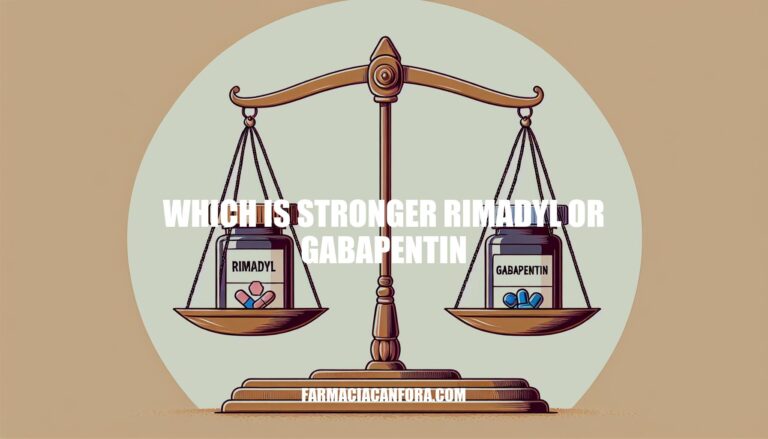Understanding whether Rimadyl or Gabapentin is stronger is crucial for pet owners aiming to manage their pets’ pain effectively. Rimadyl, an anti-inflammatory, and Gabapentin, a nerve pain reliever, serve different purposes. Comparing their strengths helps pet owners make informed decisions for their pets’ well-being, ensuring the most suitable and effective pain management solution.
Mechanism of Action
Rimadyl (Carprofen):
- Mechanism of Action: Rimadyl is a non-steroidal anti-inflammatory drug (NSAID) that works by inhibiting cyclooxygenase (COX) enzymes, specifically COX-2, which are involved in the production of prostaglandins. Prostaglandins are chemicals in the body that cause inflammation, pain, and fever.
- Pain and Inflammation Relief: By reducing the production of prostaglandins, Rimadyl decreases inflammation and alleviates pain, making it effective for conditions like arthritis and post-surgical pain.
Gabapentin:
- Mechanism of Action: Gabapentin is an anticonvulsant that affects the nervous system. It works by inhibiting the release of excitatory neurotransmitters, which reduces the transmission of pain signals in the nervous system.
- Pain and Inflammation Relief: Gabapentin is particularly effective for neuropathic (nerve-related) pain. It helps manage chronic pain conditions by altering the way nerves send pain signals to the brain.
- The strength of these medications depends on the type of pain being treated. Rimadyl is generally stronger for inflammatory pain due to its anti-inflammatory properties. Gabapentin, on the other hand, is stronger for nerve-related pain. Therefore, the effectiveness of each medication varies based on the specific pain condition being addressed.
Effectiveness in Pain Management
Rimadyl (Carprofen) and Gabapentin are both used in veterinary medicine but target different types of pain:
- Rimadyl is a non-steroidal anti-inflammatory drug (NSAID) primarily used to manage inflammatory pain such as arthritis or post-surgical discomfort. It works by reducing inflammation, which in turn alleviates pain.
- Gabapentin is used for nerve-related pain (neuropathic pain), such as neuropathy or chronic pain conditions. It works on the nervous system to reduce nerve-related pain or discomfort.
Clinical Studies and Veterinary Insights:
- Rimadyl: Studies have shown that Rimadyl is effective in reducing pain and inflammation in dogs with osteoarthritis and post-operative pain. It is generally well-tolerated but can have side effects like gastrointestinal issues.
- Gabapentin: Clinical studies indicate that Gabapentin is effective in managing chronic neuropathic pain and can be used in combination with other pain medications for enhanced pain relief. It is particularly useful for conditions where the nerves have become sensitized due to long-term injury or chronic conditions.
Which is Stronger?
- The effectiveness of Rimadyl vs. Gabapentin depends on the type of pain being treated. For inflammatory pain, Rimadyl is generally more effective. For nerve-related pain, Gabapentin is the preferred choice.
Side Effects and Risks
Rimadyl (Carprofen)
Common Side Effects:
- Gastrointestinal issues: vomiting, diarrhea, decreased appetite.
- More serious risks: gastric ulcers, liver or kidney damage, especially with long-term use or in pets with pre-existing conditions.
Gabapentin
Common Side Effects:
- Central nervous system effects: sedation, dizziness, gait instability.
- Drowsiness and lethargy, particularly when starting or increasing dosage.
Safety and Tolerability Comparison
- Rimadyl: Effective for reducing pain and inflammation but carries a higher risk of gastrointestinal and organ-related side effects, particularly with long-term use.
- Gabapentin: Generally considered safer in terms of gastrointestinal and organ impact but can cause significant central nervous system effects like sedation and dizziness.
In terms of safety and tolerability, Gabapentin might be considered stronger due to fewer severe organ-related side effects, but its central nervous system effects can still be quite impactful. Always consult with a veterinarian to determine the best option for your pet’s specific needs.
Veterinary Recommendations
Rimadyl (Carprofen) and Gabapentin are commonly used in veterinary medicine for pain management, but they serve different purposes and are used for different types of pain.
Rimadyl (Carprofen)
- Type of Pain: Primarily used for inflammatory pain, such as arthritis or post-surgical pain.
- Mechanism: Non-steroidal anti-inflammatory drug (NSAID) that reduces inflammation and pain.
- Recommendations: Generally safe for short-term use but requires monitoring for potential side effects like gastrointestinal issues or liver problems.
Gabapentin
- Type of Pain: Effective for neuropathic pain, chronic pain, and as an adjunct for acute pain.
- Mechanism: Anticonvulsant that modulates nerve signals to reduce pain.
- Recommendations: Often used in combination with other pain medications. Requires careful dosing and monitoring, especially in pets with kidney or liver issues.
Expert Opinions on Strength
- Rimadyl is considered stronger for inflammatory pain due to its anti-inflammatory properties.
- Gabapentin is preferred for neuropathic pain and can be more effective when combined with other medications for comprehensive pain management.
Both medications can be used together under veterinary supervision to address different types of pain effectively. Always consult with a veterinarian to determine the best treatment plan for your pet’s specific condition.
In Conclusion
Rimadyl and Gabapentin are two distinct medications used in veterinary medicine for pain management, each with its own strengths and weaknesses.
Rimadyl is generally stronger for inflammatory pain due to its anti-inflammatory properties, while Gabapentin is preferred for neuropathic pain.
The effectiveness of these medications depends on the type of pain being treated, and they can be used together under veterinary supervision to address different types of pain effectively.
It is essential to consult with a veterinarian to determine which medication is stronger for an individual pet’s needs, as they can provide personalized guidance based on the pet’s specific condition and medical history.


